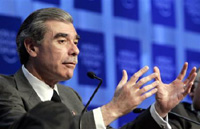US, Chinese trade officials to begin talks on economic issues

The United States and China have downplayed points of contention in trade relations Monday as they prepared for the difficult talks on economic issues from exchange rates to product safety.
The talks come amid rising anger in the U.S. Congress over China's massive trade surplus and demands that Washington act forcefully to compel Beijing to halt what some members see as currency manipulation and other unfair trade practices.
Discussions are set to begin Tuesday with a one-day meeting of the China-U.S. Joint Commission on Commerce and Trade that deals with near-term regulatory and legal issues.
That is followed Wednesday and Thursday by the third round of the Strategic Economic Dialogue that grapples with longer-term economic plans. Vice Premier Wu Yi, a former chief trade negotiator, leads the Chinese side.
In remarks to a seminar on innovation in Beijing, U.S. Commerce Secretary Carlos Gutierrez acknowledged protectionist pressures in both the U.S. and China.
"We have to continue opening global markets. America and China must work together to stem the tide of protectionist sentiment in our nations," Gutierrez said.
"It is ironic that we have found that protectionism does not protect. The only thing that does protect is innovation and engaging with the world, competing, being more productive," he said.
In an interview with the official English-language China Daily newspaper, Vice Commerce Minister Chen Deming stressed the rising interdependence of the U.S. and Chinese economies, and warned their trade could be harmed by focusing too closely on the value of the yuan and intellectual property rights.
"The two sides should clarify the responsibility each side should shoulder, face and resolve structural problems in the economy, and strengthen dialogue and communication," Chen was quoted as saying.
Along with finance and trade policy, concern over the safety of China's food and other exports is expected to be a major focus of talks following scandals over products from pet food ingredients to toys.
Gutierrez said he believed China's reputation as an exporter was facing a "watershed moment" that compelled it to take strong action.
"How they deal with these issues they've had with product safety is very important to China," he told a briefing for journalists later Monday.
"I would have to assume that the brand 'China' is very important to the Chinese," he said.
U.S. Health Secretary Mike Leavitt was to sign an agreement in Beijing on Tuesday on food and feed product safety, and a second on drugs and medical devices.
Other officials taking part in the talks include U.S. Treasury Secretary Henry Paulson, U.S. Trade Representative Susan Schwab, and Acting Secretary of Agriculture Charles Conner.
The discussions come as the U.S. trade deficit with China appears set to surpass last year's record US$233 billion (EUR159 billion), according to U.S. Commerce Department figures.
That has stoked the arguments of critics who allege that China keeps the yuan artificially low to boost exports to the United States while making U.S. goods more expensive in China.
Seeking to emphasize the mutual benefits of China-U.S. trade, Gutierrez later attended a ceremony where Wal-Mart China said it had received approval to open its 100th store in China.
Also Monday, the Timken Co. signed an agreement with Xiangtan Electric Manufacturing Co. to build a factory in Hunan province to make bearings for wind turbines in a deal that will bring Timken US$110 million (EUR75 million) in export sales.
Subscribe to Pravda.Ru Telegram channel, Facebook, RSS!





